Rivian Bundle
Who Really Owns Rivian?
Understanding the Rivian SWOT Analysis is crucial, but have you ever wondered who truly calls the shots at Rivian, the innovative electric vehicle company? Rivian's journey, marked by a blockbuster IPO and ambitious goals, makes its ownership structure a fascinating subject. Knowing who owns Rivian offers critical insights into its future direction and potential for growth.
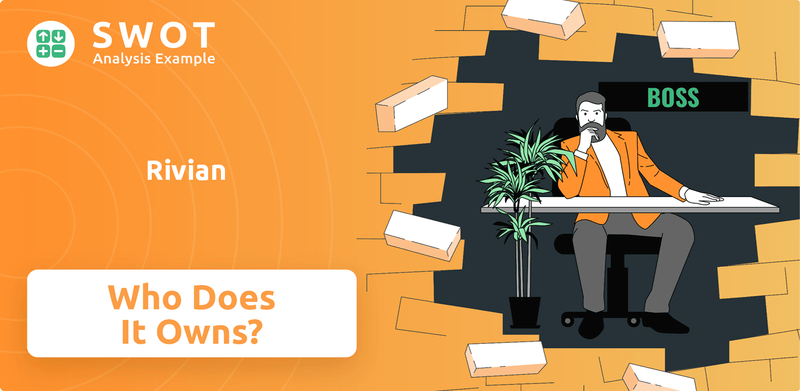
From its early days to its current valuation, the evolution of Rivian's ownership structure is a story of strategic partnerships, venture capital backing, and public market participation. This article will explore the key Rivian investors, the influence of its founder, and the overall impact of its ownership on the company's strategic decisions and its position in the electric vehicle market. Discover the answers to questions like: Who founded Rivian? Who is the CEO of Rivian? and Who are Rivian's major shareholders?
Who Founded Rivian?
The story of Rivian's electric vehicle company begins with its founder, Robert 'RJ' Scaringe. He established the company in June 2009, initially operating as Mainstream Motors before later transitioning to Avera Automotive and, finally, Rivian Automotive in 2011. Scaringe's background in engineering and his passion for environmental sustainability were crucial to the company's mission.
Early funding for Rivian came from Scaringe himself, along with angel investors. While the exact amounts from these early investments are not public, their role was critical in the company's early stages. The company's initial focus was on a mid-engine hybrid coupe, but it soon shifted to electric vehicles, specifically trucks and SUVs, reflecting a strategic pivot towards sustainable transportation.
Rivian's journey began with Scaringe, who holds a Ph.D. in mechanical engineering from MIT's Sloan Automotive Lab. His vision for electric adventure vehicles has been a driving force behind the company's direction. The company's evolution reflects a commitment to innovation and a sustainable future in the automotive industry.
RJ Scaringe founded Rivian in June 2009. Initially named Mainstream Motors, it later became Avera Automotive and then Rivian Automotive in 2011.
Scaringe has a Ph.D. in mechanical engineering from MIT. His passion for cars and environmental sustainability shaped Rivian's mission.
Initially, Rivian prototyped a mid-engine hybrid coupe. The focus shifted to electric vehicles, including trucks and SUVs, by 2011.
Early funding included founder capital and angel investments. Abdul Latif Jameel, through JIMCO, was an early investor.
JIMCO secured 114 million shares of Rivian stock in 2018 for $303 million. This investment was crucial in the early stages.
The shift to electric adventure vehicles aligned with the founding team's vision for sustainable transportation. This strategic move set the stage for future growth.
The initial ownership structure of Rivian was centered around its founder, RJ Scaringe, with early financial backing coming from founder capital and angel investors. The company's early financial backers played a crucial role in its initial growth and development. The investment firm Abdul Latif Jameel, through its investment arm JIMCO, was one of the early investors in Rivian.
- Rivian ownership began with RJ Scaringe as the founder.
- Early funding included founder capital and angel investments.
- JIMCO invested in 2018, securing 114 million shares for $303 million.
- The focus shifted from a hybrid coupe to electric adventure vehicles.
Rivian SWOT Analysis
- Complete SWOT Breakdown
- Fully Customizable
- Editable in Excel & Word
- Professional Formatting
- Investor-Ready Format
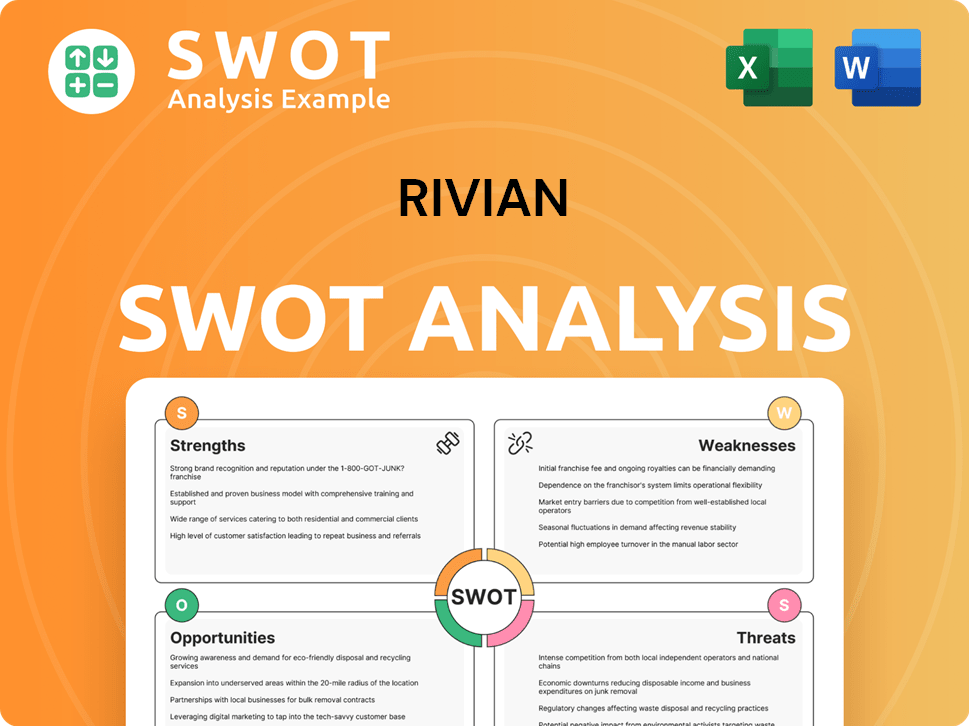
How Has Rivian’s Ownership Changed Over Time?
The ownership structure of the electric vehicle company, particularly since its Initial Public Offering (IPO) on November 10, 2021. The IPO was a significant event, raising $13.5 billion with shares priced at $78.00 each. This event valued the company at $66.5 billion. On its first trading day, the stock closed at $100.73 per share, with a market value approaching $100 billion. This marked a pivotal moment in the evolution of the company's ownership, attracting a diverse range of investors and reshaping its financial landscape.
The shift in ownership has been dynamic, with institutional investors holding a substantial portion of the company's stock. The entry and exit of major automotive players like Ford, along with the substantial investment from Volkswagen, directly impacted Rivian's strategic alliances, capital for expansion, and overall governance. As of May 2025, institutional investors hold approximately 45.02% of the stock, while insiders own around 0.59%, and public companies and individual investors hold 54.39%.
| Stakeholder | Stake | Details |
|---|---|---|
| Amazon.com Inc. | ~17% to 18.1% | Largest institutional shareholder; strategic deal for 100,000 electric delivery vehicles. |
| Volkswagen Group | Up to $5 billion investment | Strategic joint venture to develop next-generation EV technology, with an initial $1 billion investment. |
| Ford Motor Company | 1.6% (May 2024) | Reduced stake after selling approximately 90% of its shares by the end of 2022. |
| RJ Scaringe | ~1.4% | Founder and CEO; owns 4,120,472 shares as of May 19, 2025. |
The major stakeholders in the company include Amazon.com Inc., which is the largest institutional shareholder, holding approximately 17% to 18.1% of the company's stock. Amazon also has a strategic deal with the company for 100,000 electric delivery vehicles. Other key investors include Volkswagen Group, which announced its intention to invest up to $5 billion in June 2024, and Ford Motor Company, which has significantly reduced its stake. The founder and CEO, RJ Scaringe, remains a significant individual shareholder, owning about 1.4% of the company. Understanding the dynamics of the company's ownership is crucial for anyone interested in the Competitors Landscape of Rivian, as it directly influences the company's strategic direction and financial health.
The ownership of the company is primarily held by institutional investors, with Amazon being the largest.
- Amazon's significant investment supports its strategic goals.
- Volkswagen's investment signals confidence in the company's future.
- Ford has reduced its stake, reflecting a shift in strategy.
- RJ Scaringe, the CEO, maintains a significant ownership stake.
Rivian PESTLE Analysis
- Covers All 6 PESTLE Categories
- No Research Needed – Save Hours of Work
- Built by Experts, Trusted by Consultants
- Instant Download, Ready to Use
- 100% Editable, Fully Customizable
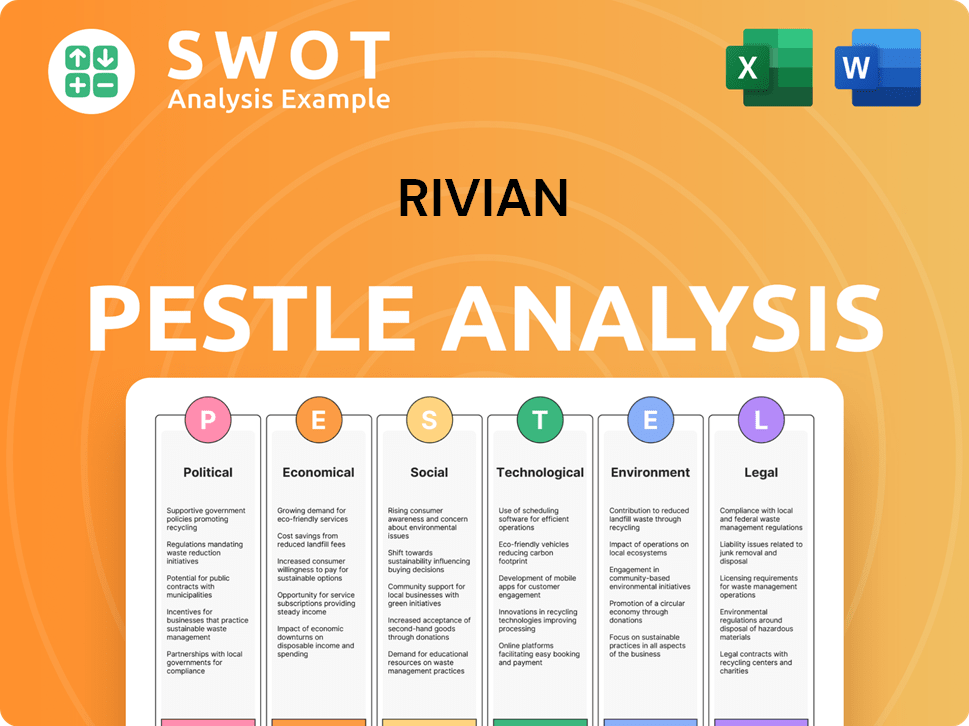
Who Sits on Rivian’s Board?
Understanding Rivian's ownership structure is crucial for investors and anyone interested in the electric vehicle company. Rivian operates under a dual-class share system. This system impacts voting rights and control within the company. Class A common stock, which is publicly traded, grants one vote per share. Class B common stock, primarily held by insiders, provides ten votes per share.
This structure allows key figures, like the founder and CEO, Robert J. Scaringe, to maintain significant influence. As of June 13, 2025, Scaringe's ownership in Rivian includes approximately 4,120,472 shares. This includes his Class B shares, which give him substantial voting power. His control allows him to influence board decisions and major corporate actions.
| Director | Title | Class |
|---|---|---|
| Robert J. Scaringe | Chief Executive Officer | N/A |
| Jay Flatley | Director | III |
| John Krafcik | Director | III |
The Board of Directors is structured into three classes, each serving staggered three-year terms. At the June 2024 annual meeting, Jay Flatley and John Krafcik were elected as Class III directors, their terms extending until the 2027 annual meeting. Because stockholders do not have cumulative voting rights, a majority of the voting power can elect all directors.
Rivian's dual-class share system gives significant control to insiders, especially the CEO. This structure influences how decisions are made and who has the most say. Understanding this is important for anyone looking at Rivian stock or the company's future.
- Robert J. Scaringe, the CEO, holds Class B shares with enhanced voting rights.
- Class A shares have one vote per share, while Class B shares have ten.
- The Board of Directors has staggered terms, with elections each year.
- The dual-class structure is a common topic in discussions about corporate governance.
Rivian Business Model Canvas
- Complete 9-Block Business Model Canvas
- Effortlessly Communicate Your Business Strategy
- Investor-Ready BMC Format
- 100% Editable and Customizable
- Clear and Structured Layout
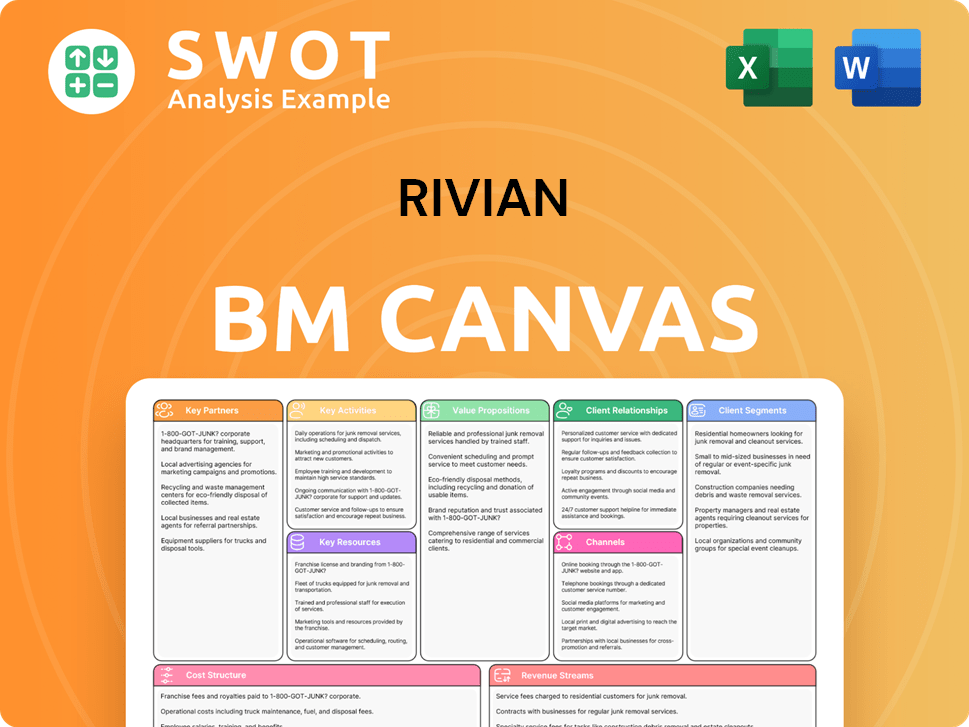
What Recent Changes Have Shaped Rivian’s Ownership Landscape?
Over the past few years, the ownership landscape of the Rivian electric vehicle company has seen significant shifts. A key development was the announcement in June 2024 of the Volkswagen Group's plan to invest up to $5 billion in Rivian, with an initial $1 billion expected by June 30, 2025, and the remainder by 2026. This investment is tied to a strategic joint venture focused on developing next-generation EV technology, starting with Rivian's R2 platform. This signals a strong vote of confidence in the company's future.
Conversely, Ford Motor Company, an early investor, has reduced its stake substantially. By the end of 2022, Ford had sold approximately 90% of its Rivian shares for $3 billion, a significant return on its initial $1.2 billion investment. As of May 2024, Ford's ownership is at 1.6%. Founder and CEO Robert J. Scaringe has also been involved in stock transactions, selling shares in January 2025 as part of a pre-arranged trading plan. As of May 19, 2025, Scaringe owns 4,120,472 shares of Rivian.
| Ownership Category | As of May 2025 | Details |
|---|---|---|
| Institutional Owners | 1,109 | Hold a total of 665,905,661 shares |
| Major Institutional Investors | Amazon.com Inc., Vanguard Group Inc., BlackRock, Inc., Baillie Gifford & Co, UBS Group AG | Significant holdings |
| Hedge Funds and Other Institutional Investors | 66.25% | Ownership percentage as of June 14, 2025 |
Institutional ownership remains a dominant force in Rivian's ownership structure. As of May 2025, there are 1,109 institutional owners holding a total of 665,905,661 shares. Key institutional investors include Amazon.com Inc., Vanguard Group Inc., and BlackRock, Inc. Hedge funds and other institutional investors collectively owned 66.25% of Rivian's stock as of June 14, 2025. The company has not engaged in share buybacks recently, focusing instead on scaling production and achieving profitability. For more insights, explore the Growth Strategy of Rivian.
Volkswagen Group's investment of up to $5 billion, with $1 billion expected by June 30, 2025.
Ford's ownership reduced to 1.6% as of May 2024 after selling a significant portion of its shares.
Institutional investors hold a significant portion of the company's stock, with 1,109 owners as of May 2025.
Rivian produced 49,476 vehicles and delivered 51,579 in 2024, with production plans for 46,000 to 51,000 vehicles in 2025.
Rivian Porter's Five Forces Analysis
- Covers All 5 Competitive Forces in Detail
- Structured for Consultants, Students, and Founders
- 100% Editable in Microsoft Word & Excel
- Instant Digital Download – Use Immediately
- Compatible with Mac & PC – Fully Unlocked
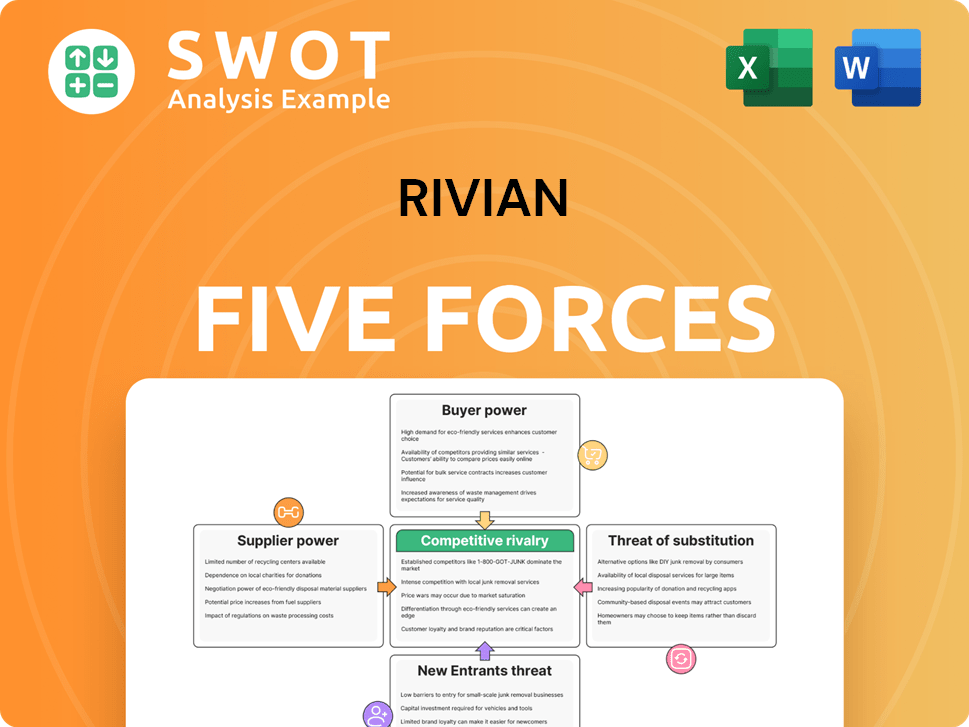
Related Blogs
- What are Mission Vision & Core Values of Rivian Company?
- What is Competitive Landscape of Rivian Company?
- What is Growth Strategy and Future Prospects of Rivian Company?
- How Does Rivian Company Work?
- What is Sales and Marketing Strategy of Rivian Company?
- What is Brief History of Rivian Company?
- What is Customer Demographics and Target Market of Rivian Company?
Disclaimer
All information, articles, and product details provided on this website are for general informational and educational purposes only. We do not claim any ownership over, nor do we intend to infringe upon, any trademarks, copyrights, logos, brand names, or other intellectual property mentioned or depicted on this site. Such intellectual property remains the property of its respective owners, and any references here are made solely for identification or informational purposes, without implying any affiliation, endorsement, or partnership.
We make no representations or warranties, express or implied, regarding the accuracy, completeness, or suitability of any content or products presented. Nothing on this website should be construed as legal, tax, investment, financial, medical, or other professional advice. In addition, no part of this site—including articles or product references—constitutes a solicitation, recommendation, endorsement, advertisement, or offer to buy or sell any securities, franchises, or other financial instruments, particularly in jurisdictions where such activity would be unlawful.
All content is of a general nature and may not address the specific circumstances of any individual or entity. It is not a substitute for professional advice or services. Any actions you take based on the information provided here are strictly at your own risk. You accept full responsibility for any decisions or outcomes arising from your use of this website and agree to release us from any liability in connection with your use of, or reliance upon, the content or products found herein.